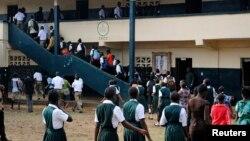A battle is shaping up in the West African nation of Liberia over a proposed overhaul of the education system that the nation's teachers union has rejected.
Liberian school teachers are now threatening a nationwide strike if their government goes ahead with a proposed public-private education partnership. Samuel Johnson, senior secretary general of the National Teachers Association of Liberia says the teachers approved the strike resolution on Tuesday.
The government has signed a memorandum of understanding with Bridge International Academies, a low-cost nursery and primary private schools system that uses a technology-based approach to provide standardized education to students in developing countries.
Poor student performance
Liberia’s education minister, George Werner, told VOA the government is not privatizing the nation’s public education system. Rather he said it is entering into a public-private partnership for education because the current poor performance level of Liberian schools requires drastic action.
But Johnson said the proposed partnership is not feasible, sustainable, and it violates Liberia’s constitution and education laws.
Lack of high tech infrastructure
“Based on our research, we told him [Mr. Werner] that it was not feasible to have this Bridge International Academies come teach children using digital tablets. Less than three percent of our population in Liberia has access to electricity. Also, we don’t have Internet facilities in most of our schools. Kenya has a more advanced technology than us. They have 24-hour electricity and yet Bridge International Academies is under performing there,” Johnson said.
Werner disagrees and says Liberia has the institutional set up for this technology-based type of learning.
“There are many parts of the country, from Maryland to Montserrado, to Grand Gedeh, Nimba, and Lofa, and Cape Mount where we have Internet connectivity. We haven’t covered the country in full, but we are well on our way to doing so,” Werner said.
Low graduation rate
About 1.5 million children are enrolled in primary school in Liberia, but the government said only 20 percent of the children complete 12th grade. Liberia’s protracted civil war in the 1990s has also taken its toll on the nation’s education system. In 2013, nearly 25,000 students failed the University of Liberia entrance exams.
Education Minister Werner said the government cannot continue to have students trapped in schools that are not working for them.
“The statistics are grim for us; we do not have sufficient trained and qualified teachers; our teacher attendance is poor, and the learning outcome for every student is dismal. So what we are trying to do is to leverage the best of the private sector in terms of management systems and accountability and governance to improve all of these elements and accelerate learning outcomes for our children wherever they are,” Werner said.
Teachers want more support
But Johnson said Liberia cannot continue to run its school system on a trial and error basis. He said there’s no plan for sustainability of the partnership after the five-years being proposed for the pilot project. In addition, Johnson said the Ellen Johnson Sirleaf government is slated to leave office in two years.
Johnson rejected criticism that teachers are resisting change and that they are partly to blame for the underperforming of Liberia school children. He said the problem is the lack of training and equipment and general overall funding for the current education system.
“Right now there are no textbooks in most of the schools. The very University of Liberia that is supposed to be training teachers to go and teach at the high school level, the labs are not equipped; the majority of our high schools do not have access to laboratory for students to be able to do research; biology, chemistry, and physics teachers find it very difficult. This is why most of the students are failing. But they are trying to deviate and find scapegoats, us,” Johnson said.
Pilot program
The pilot project will start with about 50 schools. Teacher's lesson guide subject areas include: English, Mathematics, Science, Social Studies, and Moral Education, according to the Memorandum of Understanding. Each teacher will be supplied with an e-reader tablet running Bridge’s suite of operating systems and applications to which all lessons and the teacher resource library will be published.
But Johnson said the teachers have asked the national legislature to stop the education minister from implementing this project.
“We have taken the issue to the national legislature because it’s a violation of our constitution, Article 6, and the education laws. We are waiting for reaction from the national legislature."
Johnson said the National Teachers Association of Liberia will call for a nationwide strike if the education minister continues to push for implementation of the public-private partnership in education.
“If he does not listen, that’s the next option. There will be a nationwide strike if they continue to impose something that we know is the feasible, not sustainable, and it is a violation of our constitution and education laws,” Johnson said.
